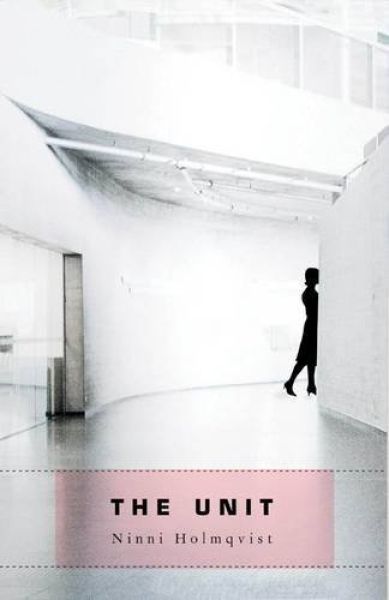What I Wouldn’t Do
The Unit
By Ninni Holmqvist (Translated by Marlaine Delargy)

8 Aug, 2017
0 comments
Ninni Holmqvist’s 2006 dystopia, The Unit: A Novel, was translated in 2008 (from the author’s Swedish to English) by Marlaine Delargy.
Dorrit Weger lived her life on the margins of Swedish society: never marrying, never having children, settling for a series of occupations that, no matter how personally satisfying, left her perpetually on the brink of insolvency. At age fifty, she is removed from her decaying house, separated from her loving dog, and consigned to the Second Reserve Bank Unit for biological material. The Unit takes in dispensable people—authors, artists, homosexuals, and other non-conformists whose occupations are of no real use—and transforms them into valuable resources, as experimental medical subjects and involuntary organ donors.
By almost every measure, the biological materials housed in the Unit have luxurious lives. The facility is neat and clean and its managers ensure that the human resources kept within it are well-fed, as healthy as their specific medical programs allow, and entertained. This is only reasonable. Someday all those organs currently housed in dispensable people will be re-purposed to make the lives of real citizens better. Nobody wants dodgy second-hand parts.
Dorrit accepts her fate and settles down to make a new life for herself in the Unit. It does not take long for her to make new friends. Her friendships drive home the central reality of life in the Unit: none of its inhabitants have long to live. Whether in the form of drug testing gone horribly wrong or simply a need for an essential organ, death will come for all of her friends and for Dorrit herself. The end is likely to be sooner rather than later.
Although men are given an extra ten years to prove their utility to the Swedish government, there are men in the Unit. The Unit’s rules do not preclude romance. Dorrit soon falls for Johannes and he for her. It’s a pleasant way to spend their final months before their final donations. Though it is unlikely that both will be salvaged simultaneously, which means it’s also a surefire way to guarantee that one or the other will have to deal with heart-breaking bereavement.
Dorrit, always so inconsiderate of those around her, throws a spanner in the works by becoming pregnant. Had this happened when she was forty-nine, the pregnancy would have kept her from the Unit. Now the only choices the Unit offers are termination of the pregnancy or adoption. Neither of which offer a reprieve to Dorrit.
An unexpected ally offers a third alternative: escape. But there’s a steep price tag: to save herself and keep her child, Dorrit will have to betray her friends.
~oOo~
I am not sure organs removed from older people who have been subjected to a battery of high-risk experiments would be the best material for transplants, but I suppose beggars cannot be choosers1.
Like most readers, my immediate reaction to the plot’s setup was to wonder what Sweden’s Total Fertility Rate might be. As it turns out, Sweden has a comparatively high TFR for Europe, but it’s still below replacement. A low TFR can have several effects (depending on immigration policies2), effects that include declining population and an aging workforce. The Unit system addresses both issues, by scaring young people into having kids and by forcibly reducing the number of defenceless old people.
Although it serves the useful purpose of allowing the majority to be spiteful towards the helpless, the Unit system doesn’t seem to be sustainable. Oddly for a dystopia, it’s actually a plot point that the Unit system is self-sabotaging. Rather unsurprisingly, while Dorrit may have been content to submit to the system, Swedes in general are so determined not to end up in a Unit and so successful at taking appropriate steps that the supply of biologic materials like Dorrit are dwindling3. The fact that a system is doomed does nothing to help the people trapped in it at the moment.
Readers expecting something along the lines of the Pretties or the Hunger Games series, wherein the protagonist takes an active role in changing the unjust system in which they live, should look elsewhere. Dorrit lacks both motivation and ability to affect anything except on a very personal level. She cannot (or at least will never try to) change the system. What she can do is choose how she reacts to it.
The Unit is available here(Amazon) and here (Chapters-Indigo).
1: Also, it’s not clear to me why one person was scrapped after her pancreas was salvaged. Humans don’t actually need a working pancreas to live.
2: It’s not clear to me if Sweden is still part of the EU but the book makes more sense if it is not. It also seems unlikely this novel’s Sweden pays even lip service to the European Convention on Human Rights, since the Units appear to violate pretty much every article.
3: Niven fans may expect the government to resort to increasingly draconian rules. It turns out there’s an implementation issue with that strategy. It seems that the majority of Swedes, having rid themselves of people with no friends, are reluctant to join the ranks of the unwanted. How odd.
